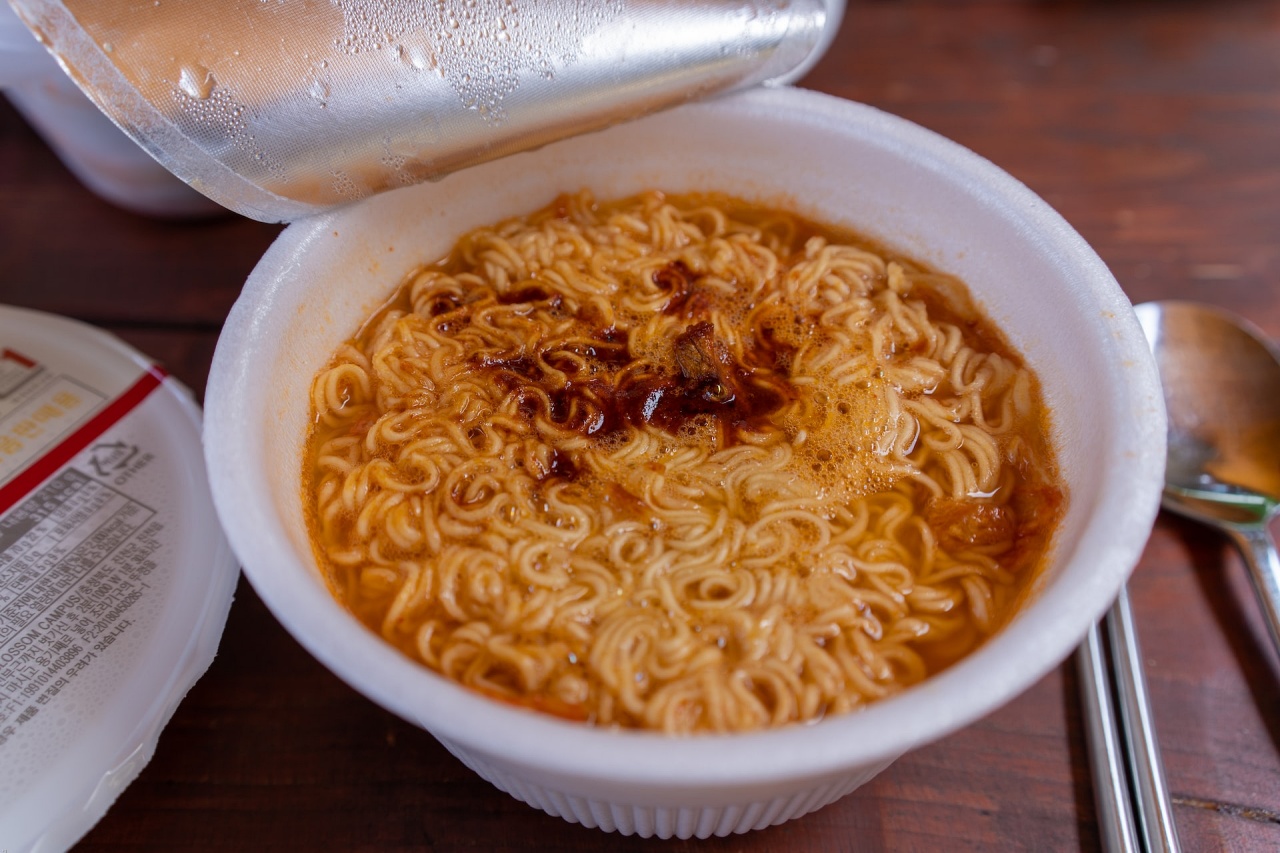Nongshim’s Shin Ramyun is one of the leading instant noodle brands in South Korea, and the company has also started exporting its products overseas. Taiwan is one of Nongshim’s customers, with thousands of Shin Ramyun being sold in the country.
However, in the recent batch of exports, Taiwan was said to have destroyed at least 1,000 boxes of Nongshim’s Shin Ramyun instant noodles. These were said to have been seized at the country’s border as they were found to contain pesticide residues.
To be more exact, Focus Taiwan reported that a total of 1,128 kilograms of Nongshim Shin Ramyun cup noodles with black tofu and kimchi were confiscated after samples that were tested on Dec. 9, 2022, showed the products’ seasoning sachets containing 0.075 mg/kg of ethylene oxide (EO). The products were locally imported by Shing Her International.
The said substance is considered a carcinogen and has been categorized by the Taiwanese Food and Drug Administration (FDA) agency as a banned pesticide. The discovery of the hazardous substance resulted in the failure of the Nongshim Shin Ramyun to pass the customs inspection in Taiwan.
The Korea Herald reported that the ethylene oxide found in the soup packets of each cup noodle is mostly used for disinfection purposes in pesticides. It is also classified as a group 1 carcinogen which is said to be the highest risk category under the World Health Organization’s standards.
Then again, Nongshim released a statement to refute the reports that its Shin Ramyun were found to have carcinogens. The company said that the component detected in its instant noodle product was 2-chloroethanol or 2-CE and not the harmful EO. Nongshim explained that the TFDA converted 2-CE levels to EO based on its state health rules, thus the results.
"We believe 2-CE was found by temporary and unintentional cross-contamination during the manufacturing process, or during the cultivation stage for the raw material production process," an official at Nongshim company said. "Nongshim uses different raw materials for exports and products sold in Korea and there is no problem with domestic products, with the analysis showing that no such ingredient was detected for domestic products."



 Bank of Japan Signals Readiness for Near-Term Rate Hike as Inflation Nears Target
Bank of Japan Signals Readiness for Near-Term Rate Hike as Inflation Nears Target  Nvidia CEO Jensen Huang Says AI Investment Boom Is Just Beginning as NVDA Shares Surge
Nvidia CEO Jensen Huang Says AI Investment Boom Is Just Beginning as NVDA Shares Surge  Nvidia, ByteDance, and the U.S.-China AI Chip Standoff Over H200 Exports
Nvidia, ByteDance, and the U.S.-China AI Chip Standoff Over H200 Exports  Amazon Stock Rebounds After Earnings as $200B Capex Plan Sparks AI Spending Debate
Amazon Stock Rebounds After Earnings as $200B Capex Plan Sparks AI Spending Debate  SpaceX Pivots Toward Moon City as Musk Reframes Long-Term Space Vision
SpaceX Pivots Toward Moon City as Musk Reframes Long-Term Space Vision  U.S.-India Trade Framework Signals Major Shift in Tariffs, Energy, and Supply Chains
U.S.-India Trade Framework Signals Major Shift in Tariffs, Energy, and Supply Chains  Taiwan Says Moving 40% of Semiconductor Production to the U.S. Is Impossible
Taiwan Says Moving 40% of Semiconductor Production to the U.S. Is Impossible  Global Markets Slide as AI, Crypto, and Precious Metals Face Heightened Volatility
Global Markets Slide as AI, Crypto, and Precious Metals Face Heightened Volatility  Yen Slides as Japan Election Boosts Fiscal Stimulus Expectations
Yen Slides as Japan Election Boosts Fiscal Stimulus Expectations  Australian Pension Funds Boost Currency Hedging as Aussie Dollar Strengthens
Australian Pension Funds Boost Currency Hedging as Aussie Dollar Strengthens  Japanese Pharmaceutical Stocks Slide as TrumpRx.gov Launch Sparks Market Concerns
Japanese Pharmaceutical Stocks Slide as TrumpRx.gov Launch Sparks Market Concerns  SoftBank Shares Slide After Arm Earnings Miss Fuels Tech Stock Sell-Off
SoftBank Shares Slide After Arm Earnings Miss Fuels Tech Stock Sell-Off  South Africa Eyes ECB Repo Lines as Inflation Eases and Rate Cuts Loom
South Africa Eyes ECB Repo Lines as Inflation Eases and Rate Cuts Loom  Kroger Set to Name Former Walmart Executive Greg Foran as Next CEO
Kroger Set to Name Former Walmart Executive Greg Foran as Next CEO  Nikkei 225 Hits Record High Above 56,000 After Japan Election Boosts Market Confidence
Nikkei 225 Hits Record High Above 56,000 After Japan Election Boosts Market Confidence  American Airlines CEO to Meet Pilots Union Amid Storm Response and Financial Concerns
American Airlines CEO to Meet Pilots Union Amid Storm Response and Financial Concerns  DBS Expects Slight Dip in 2026 Net Profit After Q4 Earnings Miss on Lower Interest Margins
DBS Expects Slight Dip in 2026 Net Profit After Q4 Earnings Miss on Lower Interest Margins 































